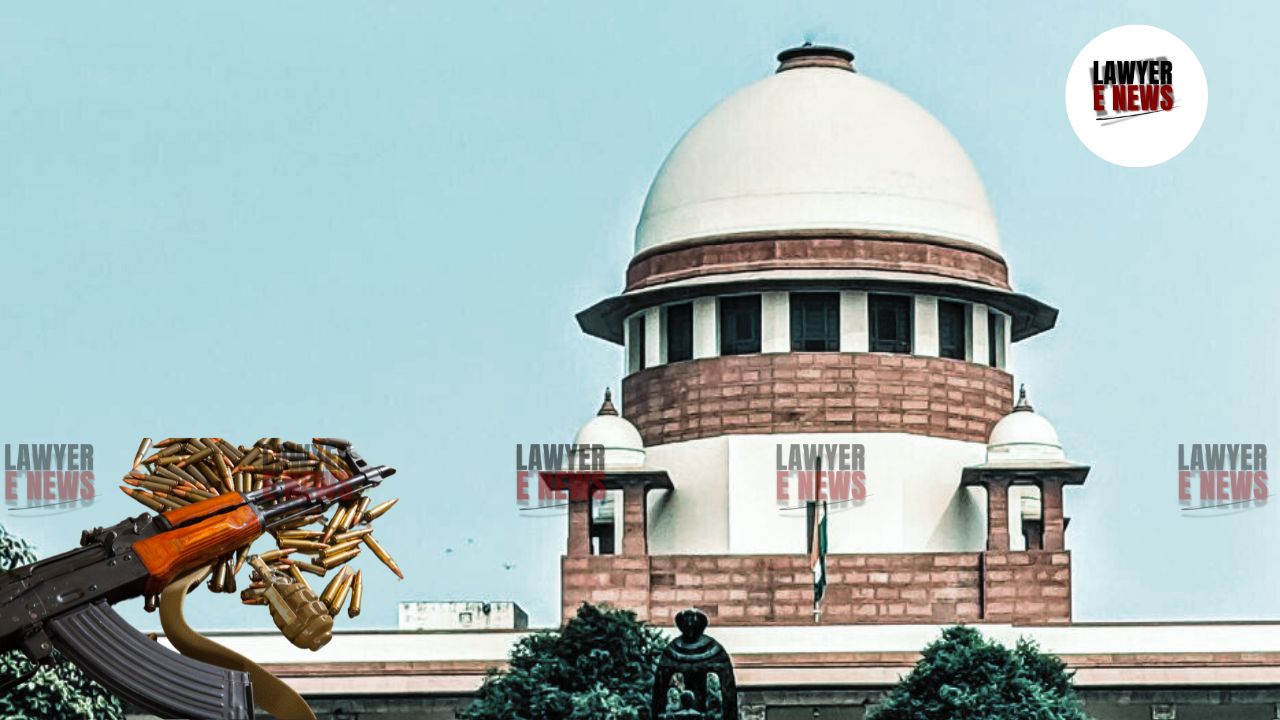-
by Admin
15 February 2026 5:35 AM



Today On 22 October 2024, Supreme Court today dismissed an Article 32 petition filed by Ghulam Nabi Guide, an 89-year-old Pakistani national, seeking remission of his life sentence to facilitate his release and return to Pakistan. The petitioner, who has spent over 30 years in prison, was convicted under the Terrorist and Disruptive Activities (Prevention) Act, 1987 (TADA) and Section 302 read with 120B of the Ranbir Penal Code for his involvement in a 1995 bomb blast in Srinagar.
Ghulam Nabi Guide was arrested on October 25, 1995, in connection with a bomb blast in Srinagar under TADA. He was acquitted by the TADA Court on March 2, 2009, but his acquittal was overturned by the Supreme Court on July 1, 2015. He was convicted under Sections 3 and 4 of the TADA and Section 302 read with 120B of the Ranbir Penal Code, and sentenced to life imprisonment.
In his petition, Guide sought remission, arguing that he had already spent over 30 years in prison. However, Rule 54.1 of the Jammu and Kashmir Prison Rules, 2002, prohibits remission for prisoners convicted of heinous offences such as terrorism. The petitioner challenged the constitutionality of this rule, citing the Supreme Court's 2023 Joseph judgment, which held that long-term prisoners should not be excluded from the possibility of premature release.
A bench of Justices B.R. Gavai and K.V. Viswanathan heard the matter and dismissed the petition as withdrawn after a detailed hearing. However, the Court noted that if the Jammu & Kashmir and Ladakh Government had recommended remission, the outcome might have been different.
Over 30 Years of Incarceration Without Remission
The petitioner, represented by Advocate Warisha Farasat, argued that Guide had already served 29 years in actual imprisonment without being granted any relief or temporary release, even for a single day. Currently lodged in Mandoli prison, Guide was first arrested in 1995 under TADA and was acquitted by the TADA Court in 2009. However, his acquittal was overturned by the Supreme Court in 2015, convicting him and sentencing him to life imprisonment.
Farasat's plea challenged Rule 54.1 of the Jammu and Kashmir Prison Rules, 2002, which excludes prisoners convicted of heinous offences, including terrorism, from being considered for remission. Citing the Supreme Court’s judgment in Joseph v. State of Kerala (2023), she argued that long-term prisoners, regardless of their crimes, should be given a chance for rehabilitation and release if they have exhibited good behavior over an extended period. She stressed that the petitioner had been in prison for an inordinately long time and deserved compassion.
"Excluding the relief of premature release to prisoners who have served extremely long periods of incarceration not only crushes their spirit, but also instills despair, signifying society's resolve to be harsh and unforgiving," Farasat quoted from the Joseph judgment.
"No Compassion for Terrorists"
The plea for remission was met with vehement opposition from Solicitor General Tushar Mehta, representing the Union. Mehta emphasized that the petitioner was a Pakistani national, who had infiltrated India without any documentation, planted bombs, and was responsible for the death of 8 innocent people while injuring 18 others. He argued that a person convicted of terrorism cannot be entrusted with the Court’s writ for compassion or remission.
"He is not someone who could be entrusted with the writ of this Court. Terrorists like him often want to go home, but their home countries refuse to accept them, as was the case with Kasab. They end up becoming symbols for further terrorist activities," Mehta stated emphatically.
Distinction Between Terrorism and Other Crimes
Advocate Warisha Farasat contended that Article 32 makes no distinction between Indian citizens and foreign nationals, asserting that the Constitution provides equal protection for all. Justice Viswanathan, however, clarified that the issue was not about citizenship but the nature of the crime. He stated that certain categories of crimes, including terrorism, fall under a complete bar from being considered for remission.
Farasat also drew attention to the Rajiv Gandhi assassination case, where individuals convicted of the assassination were eventually granted premature release by the Tamil Nadu Government. However, Justice Gavai pointed out a significant difference between the two cases. In the Rajiv Gandhi case, the Governor of Tamil Nadu had been sitting on the remission petition for over two years, and the matter was eventually referred to the President. The Supreme Court ruled that the Governor's inaction was erroneous.
"In Rajiv Gandhi's assassination case, the issue was a matter of law regarding the Governor's delay, which was incorrect. Here, the matter is different. This concerns national security," Justice Gavai remarked.
Security Concerns Prevail
The Supreme Court, while dismissing the petition as withdrawn, made it clear that national security remains paramount. Justice Gavai, addressing the plea for compassion, remarked that even in the case of Ajmal Kasab, the Pakistani terrorist involved in the 26/11 Mumbai attacks, there were arguments for showing compassion.
"There was even compassion for Kasab that he should not be hanged. But the security of the country will always hold the highest priority," Justice Gavai said in his concluding remarks.
The Court’s judgment underscores the delicate balance between the need for justice, compassion, and national security, especially in cases involving terrorism.
Ghulam Nabi Guide v. Union of India & Ors.
Date of Judgment: October 22, 2024
